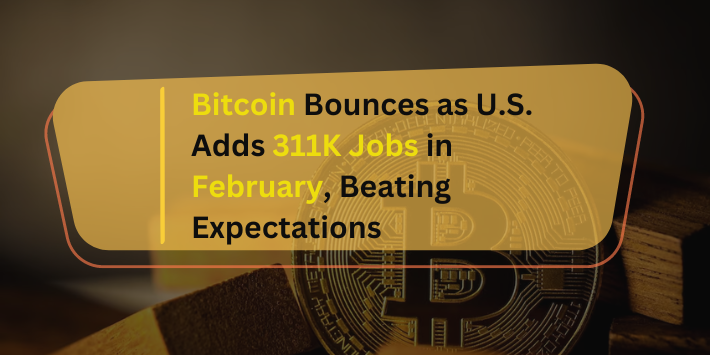According to the Nonfarm Payrolls data from the Bureau of Labor Statistics, the U.S. added 311,000 jobs in February, exceeding economist predictions of 205,000. Compared to forecasts for it to remain constant at 3.4%, the jobless rate increased to 3.6%.
The massive job gain of 517,000 in January was downgraded to 504,000.
Following an almost 8% decline in the 24 hours leading up to Friday’s employment report, Bitcoin (BTC) is marginally rebounding and is back to little over $20,000.
The morning jobs report, which is always closely watched, has gained extra significance in light of recent events. First, Federal Reserve Chairman Jerome Powell said earlier this week that in order to combat persistently high inflation, the US central bank may need to become more proactive in tightening monetary policy.
Then, on Wednesday night, cryptocurrency provider Silvergate Bank failed.
Outside of the cryptocurrency community, the Silvergate failure did not cause much worry, but it was soon followed by a collapse in the stock price of SVB Financial (SIVB), the holding company of tech-friendly lender Silicon Valley Bank (down 60% on Thursday and down another 60% in premarket trading on Friday). The SPDR S&P Bank ETF (KBE), which tracks the banking industry, experienced a 7.3% decline on Thursday.
Investors are now wondering if the problem is not cryptocurrency or technology, but rather if the past year’s rise in interest rates has left the banking sector sitting on sizable losses in their bond portfolios. As a result, the term “contagion” has now swiftly returned to the Wall Street lexicon.
A noteworthy statistic from the payrolls data for February was average hourly earnings, which were up by 0.2% but less than expected at 0.3%. This was down from 0.4% in January. Earnings increased 4.6% vs 4.4% in January on an annual basis.
Even though the unemployment rate increased, February’s 311,000 jobs gains (and the minimal downward revision to the January data) are expected to put the pressure on the Fed to keep raising interest rates, which could continue to be a hindrance for the banking industry and for bitcoin.















